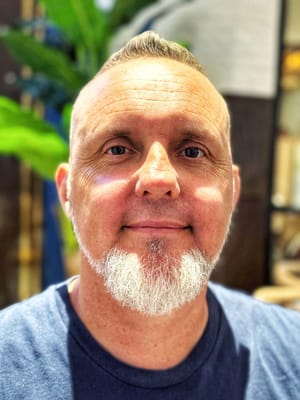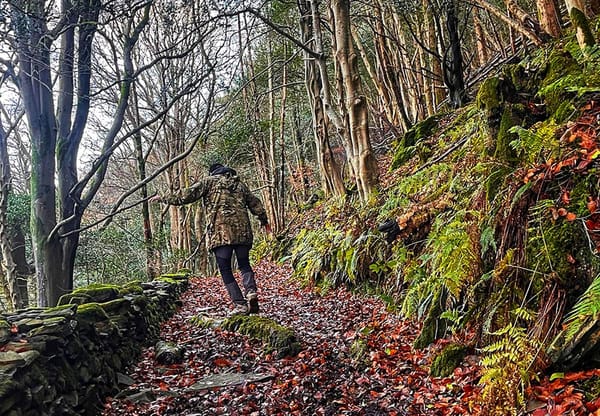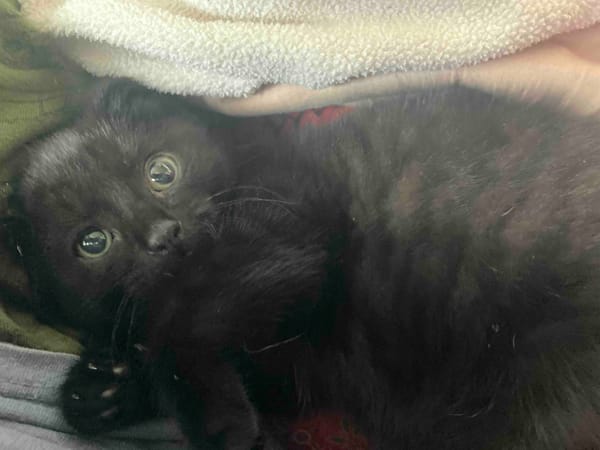The personal messages arrived like whispers in the dark. Each one began similarly: "Your article found me at exactly the right moment," or "I thought I was alone in feeling this way," or simply, "Thank you for naming what I couldn't."
In the weeks following the publication of my article, 'The Wild Economy,' my inbox became a confessional of sorts. A gathering place for the quietly desperate, the bone-tired healers, the coaches questioning their calling, philosophical counsellors wondering if insight still mattered, and the wellness practitioners wondering if they were merely offering survival strategies in a system that shouldn't be survived. What struck me wasn't just the volume of responses, but their texture: raw, urgent, relieved. Like people who had been holding their breath for years finally exhaling.
What became immediately apparent was that we weren't just naming problems, we were collectively grieving. Grieving the gap between what we know is possible and what we're forced to practice. Grieving the commodification of care. Grieving our separation from each other, maintained by the very systems we participate in to help others heal.
But beneath the grief, something else pulsed: hunger. Not for another framework or methodology, not for a new certification or platform, but for something wilder. Something true.
The Intelligence Beneath Our Feet
During my research for my MSc in Nature Connectedness, I learned about the coastal forests of the Pacific Northwest. A single Douglas Fir can be connected to dozens of other trees through an underground network of mycorrhizal fungi, a mycelium of fine white threads no thicker than a spider's silk. Through these networks, trees share not just nutrients but information: warnings about insect attacks, chemicals to boost immune defences, even carbon to feed seedlings growing in the shadows.
Suzanne Simard, the forest ecologist who helped discover this ‘wood wide web,’ found that mother trees recognise their own kin, funnelling more resources to their offspring than to stranger seedlings. When a tree is dying, it dumps its carbon reserves into the network, a final gift to the community that sustained it.
The mycelium doesn't compete. It connects. It doesn't hoard. It circulates. It doesn't perform resilience, it practices it, quietly, invisibly, moment by moment in the dark.
I keep coming back to this as more than metaphor, asking what it would mean to build human networks that operated on mycelial principles? Not the networking of business cards and elevator pitches, but the slow work of creating genuine interdependence. Not platforms designed to extract and monetise connection, but living systems that understand flourishing as collective, not individual.
Adrienne Maree Brown writes about ‘mycelial resistance,’ how the smallest connections between people can create powerful networks of change. For example, some fungi are among the largest and oldest living organisms on Earth. The largest known is a honey fungus (Armillaria ostoyae) in Oregon, spanning roughly 2.4 miles and estimated to be thousands of years old. Remarkably, it all began from a single spore.
Beyond the Scarcity Trap
The first step in growing our own mycelial networks is recognising how deeply we've internalised the logic of scarcity. This isn't just about money, though financial precarity is real and must be acknowledged. It's about how scarcity thinking has colonised our imagination, making competition feel natural and collaboration feel naive.
But let's be honest about how hard this is. We're swimming against powerful currents. The entire self-improvement industry, for example, is structured around individual success stories, personal brands, and competitive differentiation. We're told to find our niche, protect our intellectual property, scale our impact. The language itself reveals the extractive logic: scale, leverage, optimise.
If we acknowledge it or not, there is a story of separation that underlies our economic system, the myth that we are isolated individuals competing for scarce resources. The mycelial worldview offers a different story: we are interconnected beings whose flourishing is mutual, whose resources multiply through sharing, if we are only brave enough to let it.
The Sacred Art of Gathering
I keep thinking that if scarcity is the poison, authentic gathering is the antidote. But here I need to be specific, because ‘gathering' has been commodified too, turned into networking events, masterminds, and accountability groups with hidden agendas.
What I am talking about here is something radically different. Something almost extinct in our culture: spaces of non-instrumental presence. Gatherings where the point isn't to achieve, produce, or optimise, but simply to be human together.
Parker Palmer calls these ‘circles of trust,’ spaces where we don't try to fix, save, advise, or set each other straight. Instead, we practice the radical act of holding space for each other's wholeness, even in the midst of brokenness.
Reciprocity as Resistance
The third principle of mycelial community is perhaps the most radical: embracing gift economy principles within the context of late capitalism. This isn't about working for free or ignoring our material needs. It's about understanding that gift and commodity can coexist, that we can create pockets of alternative economy even while navigating the dominant system.
Lewis Hyde, in The Gift, distinguishes between logos relationships, those that are logical, contractual, and market-driven, and eros relationships, which are rooted in generosity, transformation, and mutual care. While the commodity economy operates through logos, deep change and healing occur in the realm of eros, where value circulates rather than accumulates. This mirrors anthropologist Marcel Mauss’s analysis of gift economies. Gifts are not merely objects exchanged but acts that generate and sustain relationships. Unlike commodity exchange, which is transactional and final, gift exchange fosters ongoing ties, obligations, and community.
But, and this is crucial, we must be honest about the privilege required to experiment with gift economy. Not everyone can afford to offer gift sessions. Not everyone has a safety net that allows for economic experimentation. The invitation isn't to perfection but to possibility: What small experiments in gift economy might you try? How can those with more resources create space for those with less?
The Necessary Imperfection
Here's what the mycelium knows that we forget: the network includes everything. The dying trees and the thriving ones. The parasitic fungi and the beneficial ones. The dark spots where nothing seems to grow and the places where life erupts.
Our human networks must also hold this complexity. We cannot wait for purity before we begin. We cannot exclude those still caught in compromise. The therapist working at the corporate wellness startup, the coach taking clients they'd rather not serve, the teacher exhausted from giving too much, all belong in the mycelial web.
Joanna Macy describes the Great Turning as the essential transition from an industrial growth society to a life-sustaining one. She emphasises that this turning unfolds in many forms: some people remain embedded in the old system, some are exploring alternatives, and others are actively building new models. All are part of the journey. All are needed.
This means practising what the Buddhists would call ‘radical acceptance,’ starting exactly where we are, with all our contradictions and compromises. The mycelium doesn't judge which trees deserve connection. It simply connects.
Tending Emergence
The question I'm asked most often is: "How do we scale this?" But this question itself reveals our conditioning. Mycelial networks don't scale, they emerge. They grow slowly, organically, following the contours of the landscape, responding to conditions as they arise.
This requires a different kind of patience than capitalism teaches. Mycelial time moves in seasons and cycles, not quarters and metrics. It asks us to tend conditions rather than force outcomes, to trust emergence rather than control it.
We cannot talk about building networks without addressing technology. Digital platforms promise connection but often deliver their simulation, the performance of community without its substance. Yet these same tools, used skillfully, can extend the mycelial web beyond geographic boundaries.
The key is intentionality. How do we use technology in service of genuine connection rather than letting it use us? The question then isn't whether to use technology but how to use it in alignment with mycelial principles: fostering interdependence, circulating resources, creating resilience through diversity.
The Grief and the Growing
Let me speak plainly: building mycelial community requires grieving the old dream of individual success. This is harder than it sounds. We've been conditioned to measure our worth by our separation, our distinction, our personal achievement. Letting this go can feel like death.
And perhaps it is. The ego death required to move from ‘I’ to ‘we,' from competition to collaboration, from scarcity to abundance. But as anyone who's studied fungi knows: decomposition feeds new growth. Breakdown becomes breakthrough.
Francis Weller speaks of 'the commons of grief,' a space where sorrow, when shared, becomes the soil of community. In my work, I’ve witnessed something similar, not in dramatic moments, but in quiet admissions: the weariness of trying to do good work in broken systems, the disillusionment with a profession once trusted, the ache of doing it alone. It’s not advice or tools that create real connection, but this mutual recognition of pain.
The Wild Economy Made Manifest
What I am suggesting we build here isn't new. It's ancient, as old as the first humans who understood survival as mutual, who knew that individual flourishing was impossible without collective thriving. We're not inventing but remembering.
In my mind, the wild economy isn’t just a theory, it’s a lived practice. It shows up in every authentic connection that resists being turned into a transaction, in every resource offered freely without expectation, in every gathering where people remember what it means to be human together. It’s there in the small acts of refusal, the quiet choices that push back against the logic of separation and scarcity. This isn’t about perfection or some utopian purity. It’s about orientation—about choosing a different direction. Not waiting for the old system to collapse, but planting something more alive and humane in the cracks it leaves behind.
An Invitation to Mycelium Rising
As I noted at the beginning of Part 2, when I shared Part 1 of this article, something stirred. Quiet messages arrived from unexpected corners, signs of life beneath the surface. It felt like the mycelium had spoken: there are others. More than anything, I want to see this then be watered, nourished and encouraged to grow.
And so on whim, I’ve created a small clearing in the digital forest, a place I hope we can gather. No agenda, no program, just a space to be inspired together. A space to remember, reflect, and gently weave this wild economy into something lived. If something in these words I wrote resonates with you, if you, too, are seeking connection, not performance, depth, not scale, consider adding your name to the list (and tagging others you feel might be keen to join us).
My current goal, if there is one, is modest: to meet up once a month via Zoom. I am happy to host this meet-up. We’ll meet in the spirit of the forest: slow, rooted, and real. The link is below. The invitation is open. The mycelium is already growing.











Member discussion